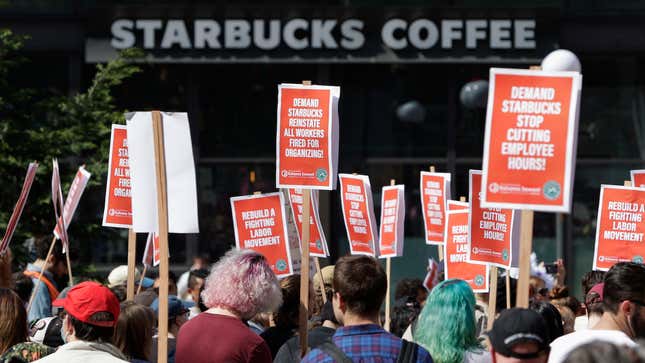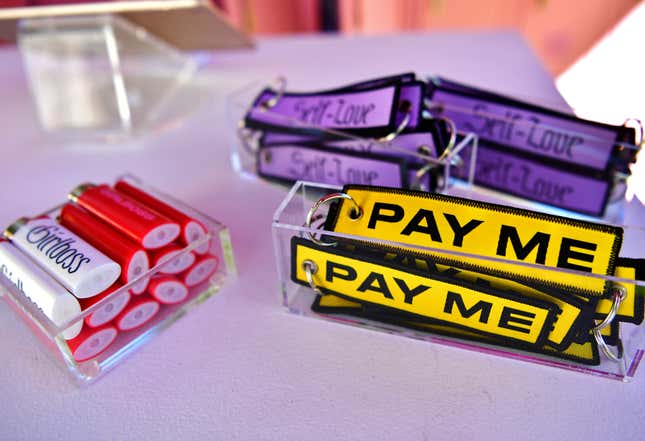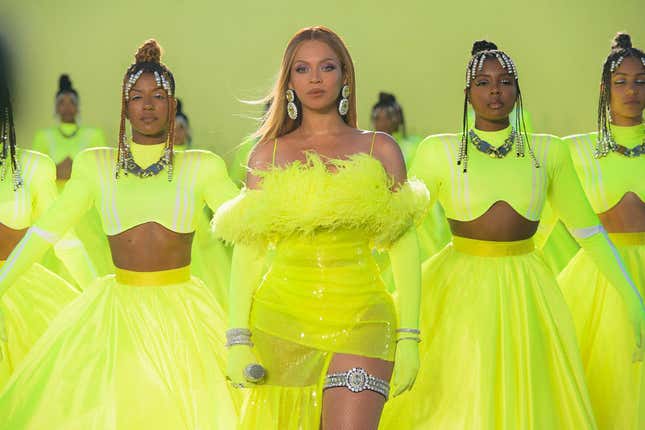
When feminism and capitalism don’t mix
The girlboss mentality, which tends to value an individual woman’s success rather than the importance of making workplaces fairer for everyone, has been on its deathbed since at least 2020. Amid a pandemic that hit women’s careers especially hard, an international reckoning on racial inequality inspired a reassessment of the merits of dubbing high-powered, high-earning corporate women as champions of feminist empowerment. The final nail in the girlboss’s millennial-pink coffin may be the shuttering of the storied women’s club and coworking space The Wing, which announced in August 2022 that it’s closing its six branches in the US for good.
The Wing, cofounded by Audrey Gelman and Lauren Kassan in 2016, embodied the girlboss era in all its contradictions. Between its political event programming and its membership roster of successful writers, CEOs, activists, and influencers, The Wing promoted the importance of female ambition and women’s solidarity—a mission that became particularly relevant in the wake of the #MeToo movement and Hillary Clinton’s loss in the US presidential election. But The Wing also frequently faced criticism for representing a particular brand of polished, privileged white feminism. Just how committed to equality could a club with $3,000-a-year memberships really be?
Those criticisms came to a head in 2020, when employees accused The Wing of being a toxic workplace with disturbing racist undertones. Gelman stepped down as CEO, and The Wing struggled on until the remote-work era persevered.
Surely there’s a better way to talk about women’s ambition in the 21st century? Let’s show this topic who’s boss.
Brief history
2013: Sheryl Sandberg, then-COO of Facebook, publishes her corporate-feminist manifesto, Lean In.
2014: Sophia Amoruso, founder of the fashion retailer Nasty Gal, coins the term “girlboss” in her memoir of the same name.
2015: Nasty Gal is sued for allegedly discriminating against pregnant employees.
2015: A Wall Street Journal exposé calls the technology behind Elizabeth Holmes’ much-ballyhooed startup Theranos into question.
2016: Nasty Gal files for bankruptcy.
2016: The Wing opens its first location in New York City.
2017: Employees of period-underwear startup Thinx accuse founder and self-proclaimed “She-EO” Miki Agrawal of sexual harassment, and Agrawal steps down.
2017: The Netflix series Girlboss, based on Amoruso’s memoir, debuts, but is canceled after its first season.
2020: Female leaders of companies like The Wing, Man Repeller, and Refinery29 resign amid allegations that they’ve perpetuated toxic and discriminatory work environments.
2021: The satirical meme “gaslight gatekeep girlboss” spreads across the internet.
2022: The Wing closes for good.

Misogyny and the girlboss
Women leaders aren’t necessarily any more ethical or upstanding than male ones, as high-profile scandals at female-led companies ranging from The Wing and Away to (at the more extreme end) Theranos have made clear. But it can still seem a bit misogynistic to dance upon the girlboss’s grave.
Writer Moira Donegan writes in a recent newsletter that the disdain heaped upon the figure of the girlboss is similar to the stigma that surrounded the trope of the cold, calculating, deeply unhappy “career woman”—encapsulated by Glenn Close’s bunny-boiling stalker in Fatal Attraction—in the 1980s. Both, she says, stem from a deep cultural discomfort with ambitious women. Meanwhile, a recent article in the BBC argues that movies and TV shows like I Care A Lot, Industry, and Succession demonize powerful women, portraying them as both ethically vacuous and personally miserable.
Girlboss discourse can be a slippery slope, shifting from rightful criticism of women who publicly espouse feminist politics while abusing their employees to deriding women in positions of power more broadly. True, individual woman founders and CEOs are not a solution to the problems of systemic sexism and racism. But as Donegan writes, girlboss mockery risks sending the message that women ought to “pursue moral purity at the expense of material progress” while men aren’t held to the same standard.
“Why would you want women to have more power in an unjust system?” Donegan asks. “Because the unjust systems are the only ones available.”
By the numbers
$3,000: Typical annual cost of a Wing membership
12,000: Number of Wing members at the height of its popularity in 2020
9,000: Number of people on the Wing’s waitlist as of March 2020
500,000: Copies of Sophia Amoruso’s #Girlboss sold, to date
4 million: Copies of Sheryl Sandberg’s Lean In sold, to date
44: Number of women leading US Fortune 500 companies
24: Number of women leading Fortune Global 500 companies
2%: Portion of VC funding received by female-led startups in the US in 2021

What comes after the girlboss?
The pandemic has reshaped a lot of people’s relationships with their careers, and by extension, it’s also played a big role in making the girlboss passé.
For one thing, school and daycare closures threw working mothers’ schedules into such turmoil that one in four women in 2020 said they were considering cutting back hours or leaving the workforce altogether. Many seem to have followed through: There were 1.1 million fewer women in the US labor force as of January 2022 compared to February 2020, according to the National Women’s Law Center (pdf). Donegan also observes that the Supreme Court’s decision to overturn Roe v. Wade this summer means that “many more women’s ambitions will be curtailed” as women are forced to carry unwanted pregnancies that radically reshape their futures.
In this climate, a glowing media profile of a female CEO offered up as a role model for the typical working woman can be more readily recognized as wildly out of touch with many people’s realities. What’s more, at a time when Americans’ approval of unions is at a 57-year high and TikTok posts of Starbucks baristas’ organizing efforts garner millions of views, being the boss may not be so aspirational anymore. It’s the workers who are winning public admiration now.

Pop quiz
What was the median pay for the 18 female CEOs of S&P 500 companies in 2021?
A. $5 million
B. $10 million
C. $16 million
D. $20 million
Find the answer below!
Rethinking ambition
The pandemic has also prompted people of all genders to reassess their relationships with their jobs, and with ambition itself. The current buzz about “quiet quitting”—choosing to do the minimum at one’s job rather than striving to be an exemplary worker—underscores just how many people are no longer interested in climbing the career ladder or making work a cornerstone of their identity.
Pandemic-induced burnout is one commonly cited factor behind this phenomenon. The realities of workplace bias, a subject of ample discussion during the Black Lives Matter protests of 2020, may also play a role in some women’s thinking about the importance of professional success. If work isn’t a meritocracy, what’s the point of putting in all that extra effort anyway?
Writing in The Cut this spring, writer Amil Niazi declared that she’d decided to choose mediocrity over ambition—in large part because her professional experience as a woman of color had taught her that hard work and talent are not reliably rewarded. Ann Friedman recently posited in Elle that many women are learning to channel the energy they once put into their individual career goals toward other ends: “a more just world, a healthier self, a stronger community.”
As for the former girlbosses accused of creating toxic work environments, time will tell if they’ve learned from their mistakes. At least one—Gelman—spoke recently about giving up on hustle culture and embarking on smaller, less intensive ventures. She recently opened her new business, an upscale country-homeware store in Brooklyn called the Six Bells that peddles wares like $35 artisanal soap carved to resemble a bunch of grapes. “Obviously, yes, the life I am living now is really different than the life I was living, but it was actually, it’s a life that I fantasized about before,” Gelman told Vanity Fair this summer. “It’s not a consolation prize, you know?”

Listen to this!
None other than the famously industrious Beyoncé seems to be feeling fed up and burned out these days. In her recent single “Break My Soul,” she sings about quitting her job: “They work my nerves / That’s why I cannot sleep a night,” the pop legend declares.
Whether you’re feeling equally frustrated with work or, like an earlier version of Beyoncé, ready to run the world, there’s a song to suit your mood. Quartz compiled a playlist that features women singing about ambition—from Dolly Parton’s classic “9 to 5” lament to Fifth Harmony’s high-flying “BO$$.” Listen here.
Poll
Who is your favorite fictional girlboss?
We know, it’s hard to pick just one.
💬 Let’s talk!
In last week’s poll about Queen Elizabeth II, 53% of you said you’ve never bought memorabilia of the late royal girlboss, but 33% of you said you bought the occasional Elizabethan tchotchke.
🤔 What did you think of today’s email?
💡 What should we obsess over next?
Today’s email was written by Sarah Todd (Tracy Flick admirer), and edited and produced by Morgan Haefner (ain’t all that bossy).
The correct answer to the pop quiz is C., $16 million. Median pay for male CEOs was $14.4 million.